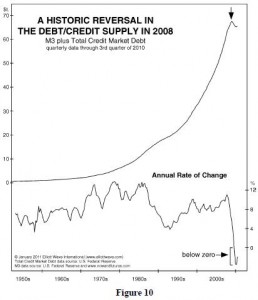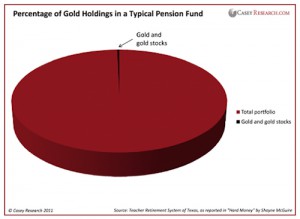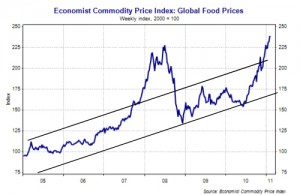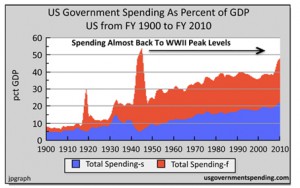When the FED began quantitative easing to halt the deflationary crash of 2008, almost everyone was convinced that it would result in massive inflation. The lone voice proclaiming that it wouldn't stop the deflationary express train wreck was Robert Prechter. In the following article Prechter explains why inflation never materialized. It is an excerpt from Prechter's, Independent Investor eBook 2011. I hope you enjoy this short excerpt. See below for details on how to get the eBook in its entirety for free. ~ Tim McMahon, editor … [Read more...]
Why $5,000 Gold May Be Too Low
Jeff Clark, BIG GOLD You already know the basic reasons for owning gold – currency protection, inflation hedge, store of value, calamity insurance – many of which are becoming clichés even in mainstream articles. Throw in the supply and demand imbalance, and you’ve got the basic arguments for why one should hold gold for the foreseeable future. All of these factors remain very bullish, in spite of gold’s 450% rise over the past 10 years. No, it’s not too late to buy, especially if you don’t own a meaningful amount; and yes, I’m convinced the price is headed much higher, regardless of the corrections we’ll inevitably see. Each of the aforementioned catalysts will force gold’s price … [Read more...]
Agflation- What is it?
Agflation, is a relatively new term coined by analysts at Merrill Lynch in 2007. Back then rising demand for agricultural products started driving up prices. Agflation is simply a combining of the words agriculture as in "agricultural commodities" and the word inflation. Inflation is commonly used to mean an increase in prices (although it originally meant an increase in the money supply which eventually resulted in an increase in prices). So agflation is simply an increase in the prices of agricultural products. But agflation is not the result of an increase in the money supply like typical inflation, but rather it is simply a result of supply and demand factors. In 2000, the world wide … [Read more...]
Escaping the Great Depression – and Extending the Greater Depression
By Doug Casey, The Casey Report Here at Casey Research, our view of the Great Depression of the 1930s is a little different from that of most people. In our eyes, Franklin Roosevelt wasn’t a hero, he was a villain. Nearly everything he did served to extend and deepen the economic downturn. With the exception of supporting the 21st Amendment for the repeal of Prohibition, Roosevelt’s involvement in the economy was an unmitigated disaster. But in popular memory, that failure is obscured by U.S. success in WW2, over which Roosevelt presided. Today, unfortunately, Obama and his minions are taking Roosevelt as a model and are straining to repeat his mistakes. Because the distortions in … [Read more...]
US Economic Situation “Intractable”
Over the last few years we've often mentioned the situation that the government has gotten itself into and wondered how it was ever going to be able to get itself out. The speculation has been that a period of hyperinflation might be the only option. In today's article David Galland editor of the Casey report discusses the economic bind the government is in and just what options it has. ~Tim McMahon, editor By David Galland, The Casey Report In describing the current situation in these United States, and in many of the world’s other superpowers, we here at Casey Research have often used the word “intractable”… as in, “impossible to resolve.” While that may not be technically … [Read more...]
The “Recovery” in Consumer Loans Isn’t Real
By Bud Conrad, The Casey Report The amount of loans being provided by our banking system is a good reflector of the strength of our economy. Below is a big-picture view that shows the total loans in the U.S. as the Fed reports in its H.8 each week. We can see that loans outstanding declined at a rapid rate at the beginning of the current great recession, but there seems to be a recovery in the little jump at the end of the chart, as highlighted by the two small black arrows. A little closer look shows that the Consumer Loans segment is the source of the optimism that we see in the total. … [Read more...]
What Most People Don’t Realize About The Fed’s Superpowers
Since its creation in 1913, the primary intended role of the U.S. Federal Reserve Bank has been that of protector. In theory, the central bank was bestowed with the power to shape monetary policy in a way that would keep both booms and busts in check. The two main tools at its disposal -- interest rates and money creation -- would provide a "ceiling of normalcy" above expansions AND a "net of safety" below contractions. To this day, the financial mainstream holds great faith in the Fed's ability to fulfill its save-the-day duties -- as these recent news items make plain: "Why Raising Fed Funds Rate Is Positive For Equities." (Seeking Alpha) "Fed's Moves Lift All Asset Classes." … [Read more...]
How to Calculate the Social Security Cost of Living Adjustment
How Does The Government Calculate the Cost of Living Adjustment (COLA) on your retirement benefits like Social Security? I recently received the following question from Jerry: What formula does the government uses to figure out COLA based on inflation for retired people each year? That is a great question! Social Security benefits are indexed for inflation to protect beneficiaries from the loss of purchasing power due to inflation. The government uses a complex averaging system to take the average CPI index for the 3rd quarter of the previous year versus the average CPI index for the current year and calculate the inflation rate based on that. Cost of Living adjustments are … [Read more...]
Understanding the Federal Reserve Bank
What's a greater threat to the U.S. economy -- inflation or deflation? To decide that... it helps to understand what role the U.S. Federal Reserve plays. Despite so much focus on the policies of the Fed, its operations remain somewhat of a mystery to most investors -- in no smaller measure, due to their complexity. Here's an excerpt of a 35-page report that explains the Fed, its goals and, very importantly, its limitations in layman's terms. … [Read more...]
Market News
Check out the latest news on the economy in this video: … [Read more...]





